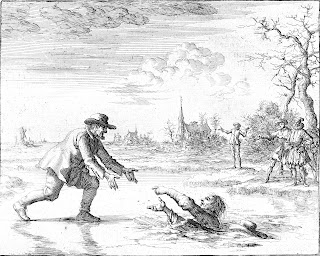 |
| Some early Anabaptists taught eternal security. |
Free Grace Theology asserts that salvation is entirely a gift of God, not by any human effort, and that eternal life is granted solely through faith in Jesus Christ, apart from any subsequent good works or perseverance. This theological framework can be contrasted with both Calvinist and Arminian views, which often emphasize the necessity of works as evidence of saving faith or human cooperation in maintaining salvation.
Free Grace views of salvation seem to have appeared within the Anabaptist movement, as we see in the Augsburg confession, which states in Article XII:
"They condemn the Anabaptists, who deny that those once justified can lose the Holy Ghost. Also those who contend that some may attain to such perfection in this life that they cannot sin."
Other evidence of eternal security comes from Lutheran polemical writings, which although hostile, may indicate a form of eternal security which is not tied to perseverance:
Source: Process, wie es soll gehalten werden mit den Widertäuffern, p.6-8
Other incorrect articles which do not concern secular government... the born again can not fall into God’s wrath and when they commit adultery, they say they are driven by the Spirit.
(This is a Lutheran polemical work against anabaptists written by eight theologians in 1558. In it, the Lutherans argued the anabaptists were to be condemned because of their beliefs and that the civil authorities were justified in punishing and executing them. This section conveys an anabaptist belief in eternal security which the Lutherans are condemning as incorrect. The second portion about adultery is probably a Lutheran interpolation critiquing the supposed ramifications of the anabaptist view. The Augsburg Confession in 1530 critiques anabaptists who believed that those who had been justified by God cannot lose the Holy Spirit in Article XII. This could lead the Lutheran theologians to falsely conclude that the ramifications of this theology are that when someone sins gravely they’re doing it in and being driven by the Holy Spirit since the Holy Spirit cannot be lost to one who has been justified; and the Holy Spirit would therefore accompany the believer in whatever sins they commit.)
However, Anabaptism was not an unified movement. The Anabaptists held a wide range of beliefs on many issues, including salvation. However, even those Anabaptists who opposed eternal security seem to have been aware of its existence, as we see in the writings of Leupold Scharnschlager:
Even today some understand Christ and Paul as ascribing righteousness and life to faith alone, as if a faith without deeds and fruit is enough for salvation. For how can it be a barren, that is, a dead faith, when life—and much more—comes forth from it? (Reformation Commentary on Scripture, New Testament XIII: Hebrews, James. Edited by Ronald K. Rittgers. Downers Grove, IL: IVP Academic, 2017, p. 233)
However, despite these words of Leupold showing that he himself disagreed with the idea, he directly mentioned the doctrine being in existence by saying "even today some understand". Thus, we see the fact that Free Grace theology existed during the early 16th century from the writings of Leupold.
However, an intriguing note is that Luther may have initially believed something close to Free Grace, as he in his early writings says:
Even if he would, he could not lose his salvation, however much he sinned, unless he refused to believe. For no sin can condemn him save unbelief alone. (The Babylonian Captivity)
However, some have posited that this is merely Luther being hyperbolic. Nevertheless, it is an intriguing possibility that maybe he started out closer to Free Grace theology, and later may have changed his mind? It is very clear that Luther was opposed to Free Grace ideas within his later writings, however his early stance seems more unclear. Nevertheless, later Lutheran confessions are explicitly hostile to Free Grace theology, and condemn those who taught it, giving the pejorative label "Antinomian":
It is true, however, that the Antinomians (who will be dealt with more extensively in a following chapter) as well as several other opponents of the Majorists were unwilling to allow the statement,”Good works are necessary.” Falsely interpreting the proposition as necessarily implying, not merely moral obligation, but also compulsion and coercion, they rejected it as unevangelical and semipopish. The word “must” is here not in place, they protested.Agricola, as well as the later Antinomians (Poach and Otto), rejected the expressions “necessarium, necessary” and “duty, debitum
One of these individuals named by the book of Concord as denying that good works are necessary for the Christian was Johannes Agricola (1494 – 1566) who was initially a companion of Luther but became separated from his teaching.
However, Free Grace-like views were also later on advocated in the "Antinomian controversy" within the 1600s American Colonies. Cotton, the leading figure in the Antinomian controversy taught the doctrine of assurance, denying that good works are necessary for our assurance. Cotton and other "Antinomians" (also called "opinionists") protested to the idea that our assurance should be placed in any way (even subordinately) in our good works.
"Trulie it is hard to perceive [between a temporary believer and a true believer] when men differ, and therefore it is not an easie matter to make such use of sanctification, as by it to beare witnesse unto justification"



No comments:
Post a Comment